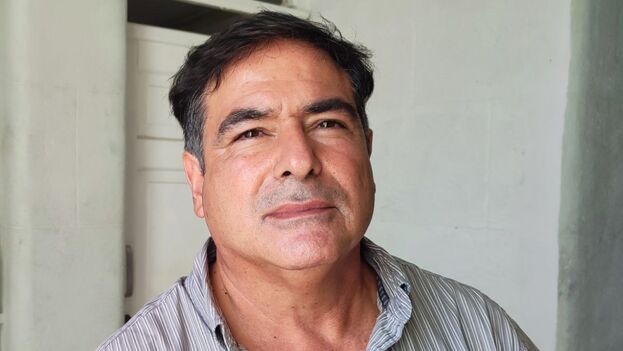
![]() 14ymedio, Reinaldo Escobar, Miami, 31 July 2023 — Dr. Fernando Vázquez is not recognized in Cuba for his skill as a doctor but for his courage as an activist for the cause in support of political prisoners. In the middle of this hot summer and harassed by the political police, he opens his doors to 14ymedio to talk about his peculiar life path that goes from Public Health to tourism to finally leads to civic action.
14ymedio, Reinaldo Escobar, Miami, 31 July 2023 — Dr. Fernando Vázquez is not recognized in Cuba for his skill as a doctor but for his courage as an activist for the cause in support of political prisoners. In the middle of this hot summer and harassed by the political police, he opens his doors to 14ymedio to talk about his peculiar life path that goes from Public Health to tourism to finally leads to civic action.
Even today it is possible that his neighbors omit the information that Vázquez is a doctor and limit themselves to saying that he works as a gardener in the building where he lives in El Vedado or that he sometimes sells avocados. They will hide his profession because Cubans who have a medical degree are prohibited from working in activities related to tourism and he asked them for discretion on that issue when he aspired to be a tourist entertainer when, in 200 he canceled his employment ties with the Ministry of Public Health.
His experience as a doctor began in 1990 when he was sent on an “internationalist mission” in Livingstone, Zambia.
“When we landed at the Lusaka airport, I was moved to see that officials from the Cuban embassy were waiting for us just at the bottom of the steps of the plane. I thought they were to welcome us, but no. They were only there to take our passports because the regulations prohibited us leaving the city to which we would be assigned.”
As an activist for the release of political prisoners, Vázquez carried out his first public action on June 14 of this year when, after announcing it on his Facebook wall, he attempted a peaceful march from Lennon Park, on 17th Street, between 6th and 8th, in the Plaza de la Revolución municipality, to the offices of the prisons department of the Ministry of the Interior, in the same neighborhood of El Vedado.
“Although I did not call out to anyone, the State Security agents who detained and interrogated me warned me that I could be prosecuted for the crime of incitement to commit a crime. The document that I wanted to hand over was not only brief but mild, almost sweet, where it implored them, begged them, those who are holding the July 11 protesters in prison to release them as soon as possible.”
In his frequent speeches on Facebook, Vázquez insists that all his activities are motivated by strictly personal motivation. “I don’t belong to any political organization,” he repeats every time. On his broadcasts he conducts himself with ease, he never seems irritated and, unusually, pronounces every letter in every word.
His skills as a communicator were honed in the days when he hosted shows for tourists at the Hemingway Marina, an occupation he took up after working in Argentina.
“I left for Argentina in 1995 as a tourist, after the polyclinic where I worked gave me a permit for a month. There I managed to get hired as a consultant in a clinic, but at that time, according to Cuban immigration laws, I could not be out of the country for more than eleven months. When I returned for the first time, with the intention of not losing my rights as a Cuban, I learned that in order to leave again I needed another permit signed by the minister. That is how I stopped having a working tie with the Ministry of Public Health. Why didn’t I stay to live there? Because I wanted to be with my mother in her last years of life and because my heart is still here, especially in las Minas de Matahambre, where I lived as a child.”
Vázquez doesn’t just talk in front of a camera. Since he defended the freedom of political prisoners, he has visited the relatives of many of them. He has knocked on almost all the doors in the La Güinera neighborhood where a protester was murdered by a police officer, he traveled to Santiago de Cuba to get to know José Daniel Ferrer‘s family up close in the Altamira neighborhood, and he has given a voice to mothers and wives of several political prisoners. On Monday, July 24, he sat on the Malecón in Havana and prayed for freedom. State Security warned him that if he does it again he will be prosecuted for disobedience.
Many of his numerous followers highlight the quixotic nature of his actions, but if Alonso Quijano went mad from an overdose of reading novels of chivalry, Dr. Vázquez sustains his behavior in other readings that have nourished his lucidity. There, all the works of José Martí and the Sermon on Mounts of Jesus of Nazareth have a special place, but also Gandhi, Emerson, John Ruskin, Tolstoy and Henry David Thoreau, who taught him the concept of civil disobedience.
“If I had to define myself in a few words, I would say that I am a peaceful disobedient willing to pay the consequences for fighting against injustice.”
____________
COLLABORATE WITH OUR WORK: The 14ymedio team is committed to practicing serious journalism that reflects Cuba’s reality in all its depth. Thank you for joining us on this long journey. We invite you to continue supporting us by becoming a member of 14ymedio now. Together we can continue transforming journalism in Cuba.
